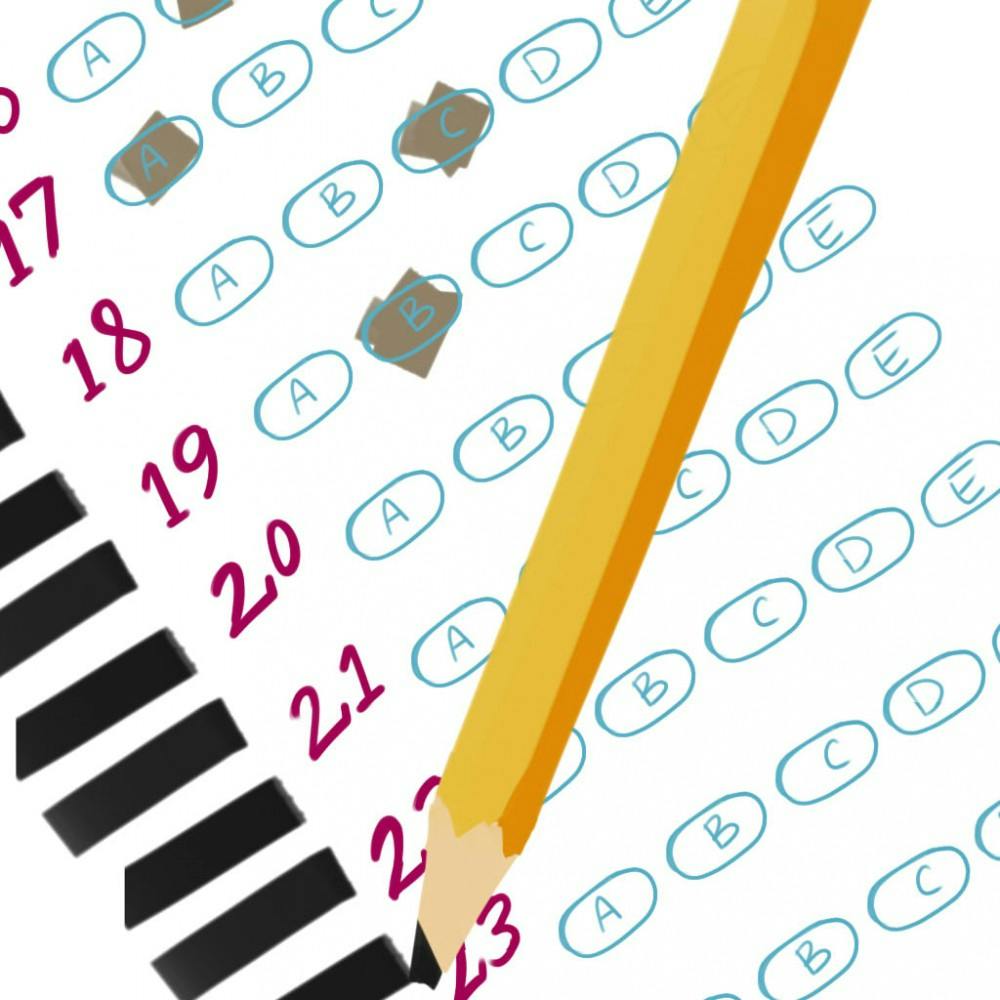This fall, sophomore Julie Nagelberg enrolled in M118: Finite Mathematics.
She went to the class and took notes, but after a few weeks, she realized she was struggling.
After seeking help, she realized succeeding in the class was not feasible and decided to drop. Now, she said she hopes to take the class online through Ivy Tech Community College.
“You’re required to take these classes, and there’s so much pressure on it,” Nagelberg said. “I’m never going to need this in my life.”
Nagelberg is one of many students feeling this way. M118 has one of the highest failure and withdrawal rates within the mathematics department, but the course remains popular because it fulfills a general education requirement.
Last spring the withdrawal rate was an average of about 45 students per class.
Students often find themselves struggling due to a variety of reasons, including weak algebraic skills and a lack of familiarity with the atmosphere of large math lecture courses, said Jee Koh, mathematics department director of undergraduate studies.
The stigma of the course can often leave students feeling discouraged.
“Hearing everyone else talk about it really intimidated me,” freshman Mckinzie Smith said.
Smith is currently in M118 and said she has found it is much different from her high school math courses. Among these differences is the pace of the course. Koh said he believes the course’s pace is extremely fast.
“Once you get behind, it is very difficult to catch up,” Koh said.
He said students should seek help the second they get lost. Nagelberg said she believes students may often feel too intimidated to speak up.
“Who really wants to raise their hand in a 300-person lecture?” Nagelberg said. “For someone that struggles, they’re not going to ask to go back to step one when they’re on step 32.”
A large lecture also does not offer the same student-to-instructor relationship a smaller class would provide, Koh said.
“It’s not easy for students to get individual attention,” Koh said. “It is very difficult to get encouraged in a large class.”
A solution to this issue could be to attend the instructor’s office hours, Koh said. As an online M119: Brief Survey of Calculus 1 teacher, he said he does not see many students utilizing this time. M119 is another class that can be taken instead of M118.
“The main problem is when students get stuck,” Koh said. “That’s the time when they really need help, but quite often students don’t seek help and just postpone their problem.”
Knowing math had always been a tough subject for her, Smith said she knew she would have to put in extra work to succeed in the course. This included attending her professor’s office hours as well as visiting the academic support center in her dorm.
These support centers are located in Briscoe Quad, Forest Quad and Teter Quad and are open from 7 p.m. to 11 p.m. Sunday through Thursday. Sign-ups start at 6 p.m.
In the support centers or office hours students may work on their algebraic skills and new concepts. Koh said he believes strong algebraic skills are necessary for the course. Students often run into problems when they make algebraic mistakes on tests.
“If they make one little algebraic mistake, it will throw off the whole problem, so they may not get the good grades they deserve,” Koh said.
Because of the large amount of students in one lecture, most M118 tests have only multiple choice or fill-in-the-blank answers. There is typically no partial credit given on these questions, Koh said.
He said he believes students struggle with algebraic math because most high schools allow calculators to be used in class and on tests. M118 does not allow calculators to be used on tests.
High school classes are typically taught at a slower pace and are less demanding of students, Koh said.
“Students from high school expect that they can finish their work in class at school, but our course is designed assuming students are working at least three hours outside a one-hour lecture,” Koh said.
“I dreaded going to class, and homework took up so much time,” Nagelberg said.
Instead of continuing M118 at IU, she said she decided to try taking the class online at Ivy Tech. This option is possible through the Indiana Core Transfer Library, but Koh said certain schools, such as the Kelley School of Business, require students to take M118, or other required classes, on the IU-Bloomington campus if they wish to apply for admission to the school.
Alternatives to this course include D116 and D117. These are joint courses that cover the material from M118 in two semesters, Koh said.
“Some students don’t want to spend two semesters on this and try to get it over with in one semester,” Koh said. “I’ve seen students keep failing trying to do it the following semester or following year.”
He said he recommends these courses as an alternative to those struggling in M118.
M106 is another course introduced this year. The course fulfills the same mathematical modeling requirement as M118 and M119, Koh said. It offers three to four separate topics instead of the one topic finite covers.
Class sizes are smaller for this course as well.
While there are alternatives to M118, Smith said she believes students need to acknowledge the course is difficult and put in the necessary work in order to do well.
“They know it’s hard, so don’t just give up,” Smith said. “You have to try. Otherwise, you’re really going to be behind.”




